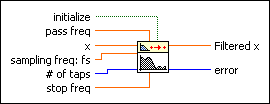 |
initialize, when TRUE, initializes the internal state of the VI.
|
 |
pass freq must be greater than zero and observe the Nyquist criterion. The default is 0.2 Hz. If pass freq is less than or equal to zero or does not meet the Nyquist criterion, the VI sets Filtered x to zero and returns an error through the Parks-McClellan VI.
|
 |
x is the input signal to filter.
|
 |
sampling freq: fs is the frequency in Hz at which you want to sample x and must be greater than zero. The default is 1.0 Hz.
|
 |
# of taps must be greater than 2. The default is 32. If # of taps is less than or equal to 2, the VI sets Filtered x to 0 and returns an error through the Parks-McClellan VI.
|
 |
stop freq must be greater than the pass freq and observe the Nyquist criterion. The default is 0.3 Hz. If stop freq is less than or equal to pass freq or does not meet the Nyquist criterion, the VI sets Filtered x to zero and returns an error through the Parks-McClellan VI.
|
 |
Filtered x contains the result of filtering the input sequence x by convolution.
|
 |
error returns any error or warning from the VI. You can wire error to the Error Cluster From Error Code VI to convert the error code or warning into an error cluster.
|
Generates a lowpass FIR filter with equi-ripple characteristics using the Parks-McClellan algorithm and # of taps, pass freq, stop freq, and sampling freq. The Equi-Ripple LowPass PtByPt VI then applies a linear-phase, lowpass filter to x to obtain Filtered x.


 Add to the block diagram
Add to the block diagram Find on the palette
Find on the palette



